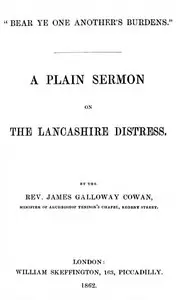"Brief Reflections relative to the Emigrant French Clergy" by Fanny Burney is a moving call for kindness and help, penned in the late 1700s. It's a piece of writing that looks closely at society and politics, specifically focusing on the hard situation of French religious leaders who had to escape to Britain because of the French Revolution. The writing urges British women to offer their support, suggesting it's their moral duty to show kindness to those suffering and displaced. Burney strongly argues that these exiled clergy members deserve help because they're good people who have been unfairly persecuted, not criminals. She contrasts the terrible events of the Revolution with the clergy's good qualities, begging British women to get involved in charity to prevent these men from becoming desperately poor, sharing vivid stories of the dangers and difficulties the clergy face. This blend of emotional and logical arguments reminds women of their shared humanity with those in need, encouraging them to offer what they can to a cause that values both faith and compassion.

Brief Reflections relative to the Emigrant French Clergy
By Fanny Burney
Driven from their homeland by revolution, virtuous men of faith seek refuge, hoping compassionate hearts will offer salvation from despair.
Summary
About the AuthorFrances Burney, also known as Fanny Burney and later Madame d'Arblay, was an English satirical novelist, diarist and playwright. In 1786–1790 she held the post of "Keeper of the Robes" to Charlotte of Mecklenburg-Strelitz, George III's queen. In 1793, aged 41, she married a French exile, General Alexandre d'Arblay. After a long writing career and wartime travels that stranded her in France for over a decade, she settled in Bath, England, where she died on 6 January 1840. The first of her four novels, Evelina (1778), was the most successful and remains her most highly regarded, followed by Cecilia (1782). Most of her stage plays were not performed in her lifetime. She wrote a memoir of her father (1832) and many letters and journals that have been gradually published since 1889, forty-nine years after her death.
Frances Burney, also known as Fanny Burney and later Madame d'Arblay, was an English satirical novelist, diarist and playwright. In 1786–1790 she held the post of "Keeper of the Robes" to Charlotte of Mecklenburg-Strelitz, George III's queen. In 1793, aged 41, she married a French exile, General Alexandre d'Arblay. After a long writing career and wartime travels that stranded her in France for over a decade, she settled in Bath, England, where she died on 6 January 1840. The first of her four novels, Evelina (1778), was the most successful and remains her most highly regarded, followed by Cecilia (1782). Most of her stage plays were not performed in her lifetime. She wrote a memoir of her father (1832) and many letters and journals that have been gradually published since 1889, forty-nine years after her death.



















